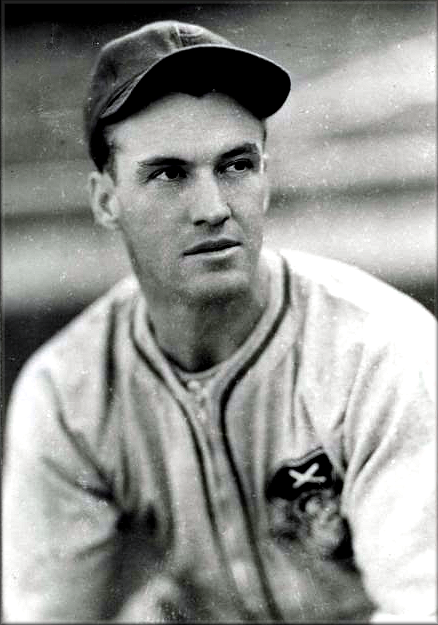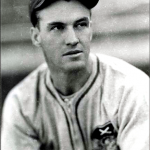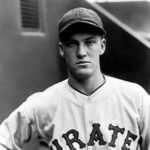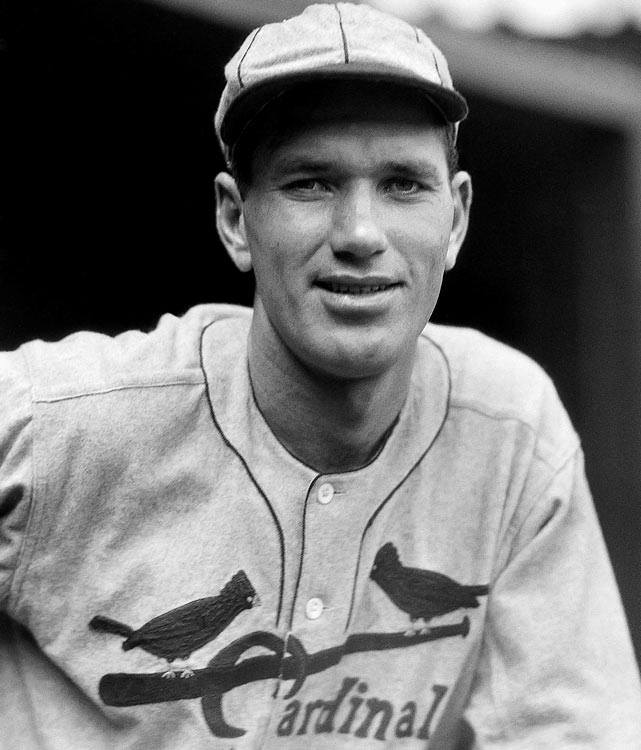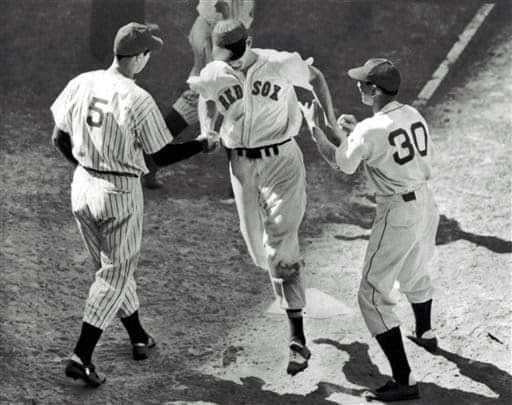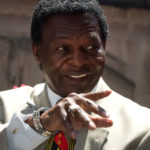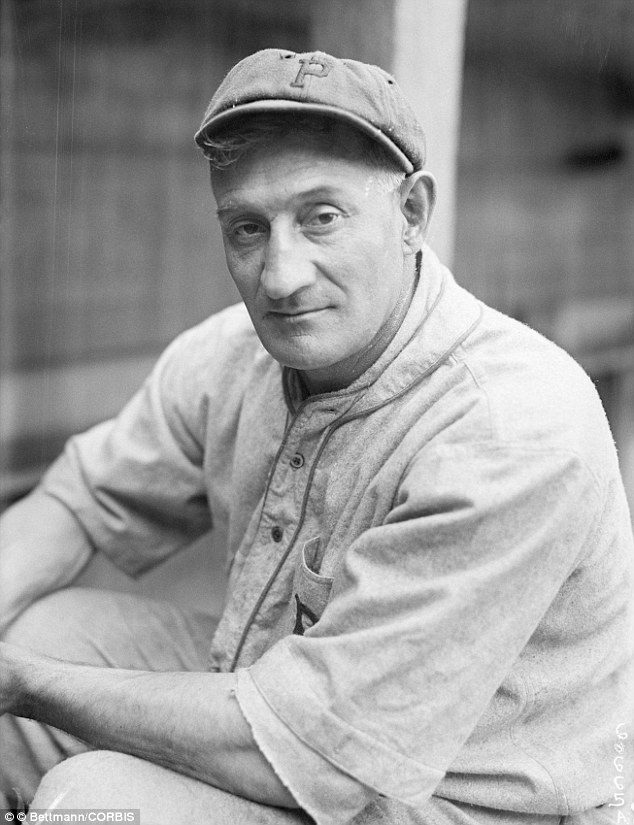Arky Vaughan Stats & Facts
Arky Vaughan Essentials
Positions: Shortstop and Third Baseman
Bats: Left • Throws: Right
Height: 5-10 Weight: 175lb
Born: March 9, 1912 in Clifty, AR us
Died: August 30, 1952 in Eagleville, CA
Buried: Eagleville Cemetery, Eagleville, CA
High School: Fullerton Union HS (Fullerton, CA)
Debut: April 17, 1932
vs. CIN 1 AB, 0 H, 0 HR, 0 RBI, 0 SB
Last Game: September 22, 1948
vs. PIT 1 AB, 1 H, 0 HR, 0 RBI, 0 SB
Hall of Fame: Inducted as Player in 1985. (Voted by Veteran’s Committee)
View Arky Vaughan’s Page at the Baseball Hall of Fame (plaque, photos, videos).
Full Name: Joseph Floyd Vaughan
View Player Bio from the SABR BioProject
Relatives: Uncle of Glenn Vaughan
Notable Events and Chronology for Arky Vaughn Career
Had he not played the same position, for the same team, as the great Honus Wagner, Arky Vaughan likely would have been better appreciated for the tremendous offensive ability he displayed during his peak seasons with the Pittsburgh Pirates. One of the greatest offensive shortstops in baseball history, Vaughan finished second to Wagner among players at the position with a .318 career batting average, while posting the highest on-base percentage (.406) of any shortstop ever to play the game over the course of his career. Vaughan also holds the 20th century record for highest single-season batting average compiled by any National League player at the position, with a league-leading mark of .385 in 1935. Vaughan annually finished among the National League leaders in runs scored, walks, on-base percentage, and triples, and he was a pretty fair fielder as well, topping all shortstops in the senior circuit in assists twice, and in putouts three times.
Biography:
Born in Clifty, Arkansas on March 9, 1912, Joseph Floyd Vaughan was raised in Fullerton, California, where he received his nickname. After attending Fullerton High School, Vaughan signed with Wichita of the Western Association in 1931, quickly making a name for himself by batting .338, with 21 homers and 145 runs scored. Promoted to Pittsburgh the following year, Vaughan earned the Pirates’ starting shortstop job early in the campaign, displaying his offensive prowess by posting a .318 batting average. However, despite exhibiting good range on defense, the 20-year-old rookie played erratically in the field, leading all league shortstops with 46 errors for the first of two straight times.
Vaughan worked extensively with his mentor and roommate on the road, Honus Wagner, a coach for the Pirates at the time. Wagner helped the young shortstop polish his defensive skills, enabling Vaughan to eventually develop into one of the senior circuit’s better fielding shortstops. Although Vaughan never came close to matching his Pirates predecessor as a defender, he regularly finished among the leaders at his position in both putouts and assists.
It was as a hitter, though, that Vaughan truly excelled. Blessed with good power and speed, as well as a keen batting eye, the Pittsburgh shortstop typically placed near the top of the league rankings in extra-base hits, runs scored, walks, and on-base percentage. After batting .314, driving in 97 runs, and leading the league with 19 triples in his second full season, Vaughan topped the circuit in both walks and on-base percentage for the first of three consecutive times in 1934. In addition to finishing first with 94 walks and a .431 on-base percentage in 1934, Vaughan placed among the league leaders with 94 runs batted in, 115 runs scored, 41 doubles, and a .333 batting average. He followed that up with the greatest season of his career in 1935, leading the senior circuit in four different offensive categories and finishing among the leaders in seven others. In addition to leading the league with a .385 batting average, a .491 on-base percentage, a .607 slugging percentage, and 97 walks, Vaughan scored 108 runs and established career highs with 19 home runs, 99 runs batted in, and 192 hits. His .385 batting average and .607 slugging percentage remain the highest single-season marks in franchise history. Vaughan’s exceptional performance earned him a third-place finish in the league MVP voting and recognition as The Sporting News National League Player of the Year.
After batting .335 and establishing new career highs with 122 runs scored and 118 walks in 1936, Vaughan finished third in the league MVP balloting again in 1938, when he placed among the league leaders with a .322 batting average, a .433 on-base percentage, and 104 walks. Vaughan remained in Pittsburgh three more years, continuing his string of ten consecutive seasons with a batting average above .300 and topping the circuit with 15 triples and 113 runs scored in 1940. Although Vaughan played in only 106 games for the Pirates in 1941, he made his eighth straight All-Star Game appearance, homering twice to become the first player to hit two home runs in one Midsummer Classic.
The pennant-winning Dodgers traded four players to Pittsburgh to acquire Vaughan at the conclusion of the 1941 campaign, ending the perennial All-Star’s tenure with his original team. Shifted to third base by the Dodgers, Vaughan had an off-year in 1942, batting just .277, to finish under .300 for the first time in his career. However, he rebounded in 1943, batting .305 and leading the National League with 112 runs scored and a career high 20 stolen bases.
Despite performing extremely well for Brooklyn in 1943, Vaughan chose not to return to the team the next year following an altercation with his loud and abrasive manager Leo Durocher. Normally a quiet and reserved man, Vaughan grew impatient as Durocher continued to carry on an argument with pitcher Bobo Newsome in front of the entire team in the Dodger clubhouse. Vaughan finally rolled up his uniform and presented it to Durocher, suggesting that he place it in a rather personal place. Vaughan then stalked out of the clubhouse, nearly inciting a rebellion among his teammates against Durocher, and permanently damaging his relationship with his manager. After numerous requests to trade him to another team fell on deaf ears, Vaughan chose to spend the entire 1944 campaign on his California ranch supporting the war effort by farming, and never sharing with the media his disdain for Durocher. Yet Vaughan’s distaste for his manager became quite apparent in 1947, when Durocher’s personal transgressions caused him to be suspended from baseball for the entire season.
After sitting out the previous three seasons, the 35-year-old Vaughan returned to the Dodgers as a part-time outfielder, third baseman, and pinch-hitter, posting a .325 batting average and a .444 on-base percentage in 153 total plate appearances for the National League pennant winners. Although Brooklyn lost the World Series to the Yankees, Vaughan batted .500 during the Fall Classic, doubling once and walking another time in three pinch-hit appearances. Vaughan remained in Brooklyn one more year before retiring at the end of a disappointing 1948 campaign during which he posted a career low .244 batting average. In addition to hitting .318 and compiling a .406 on-base percentage over the course of his 14 major-league seasons, Vaughan drove in 926 runs, scored 1,173 others, and accumulated 2,103 hits. He surpassed 100 runs scored five times, 90 runs batted in four times, and 40 doubles twice, and he also finished in double-digits in triples on eight separate occasions. In addition to leading the National League in batting once, and in both walks and on-base percentage on three separate occasions, Vaughan topped the circuit in triples and runs scored three times each.
An avid outdoorsman, Vaughan spent much of his retirement hunting and fishing. While fishing in Lost Lake, near Eagleville, California on August 30, 1952, a violent storm hit the area, causing his boat to capsize, and he and a friend to be swept away in the turbulent waters. The two men drowned, ending Vaughan’s life at only 40 years of age.
It took the Hall of Fame Veterans Committee another 33 years following his death to elect Arky Vaughan to Cooperstown. Noted for giving preferential treatment to living former stars, the Committee waited until 1985 to finally admit Vaughan to the place longtime Pittsburgh Pirates pitcher Rip Sewell always felt he belonged. Speaking of his former teammate, Sewell stated, “I’d say he (Vaughan) was as good a man at short as I ever saw. He could do it all, and he was a good hitter. He could hit for power, and he could field for average. And could he ever fly around those bases.”
@ET-DC@eyJkeW5hbWljIjp0cnVlLCJjb250ZW50IjoicG9zdF90YWdzIiwic2V0dGluZ3MiOnsiYmVmb3JlIjoiTGVhcm4gTW9yZSBhYm91dCB0aGUgdGVhbXMsIHBsYXllcnMsIGJhbGwgcGFya3MgYW5kIGV2ZW50cyB0aGF0IGhhcHBlbmVkIG9uIHRoaXMgZGF0ZSBpbiBoaXN0b3J5IC0gLSAtIC0gLSAtIC0gIiwiYWZ0ZXIiOiIiLCJsaW5rX3RvX3Rlcm1fcGFnZSI6Im9uIiwic2VwYXJhdG9yIjoiIHwgIiwiY2F0ZWdvcnlfdHlwZSI6InBvc3RfdGFnIn19@

